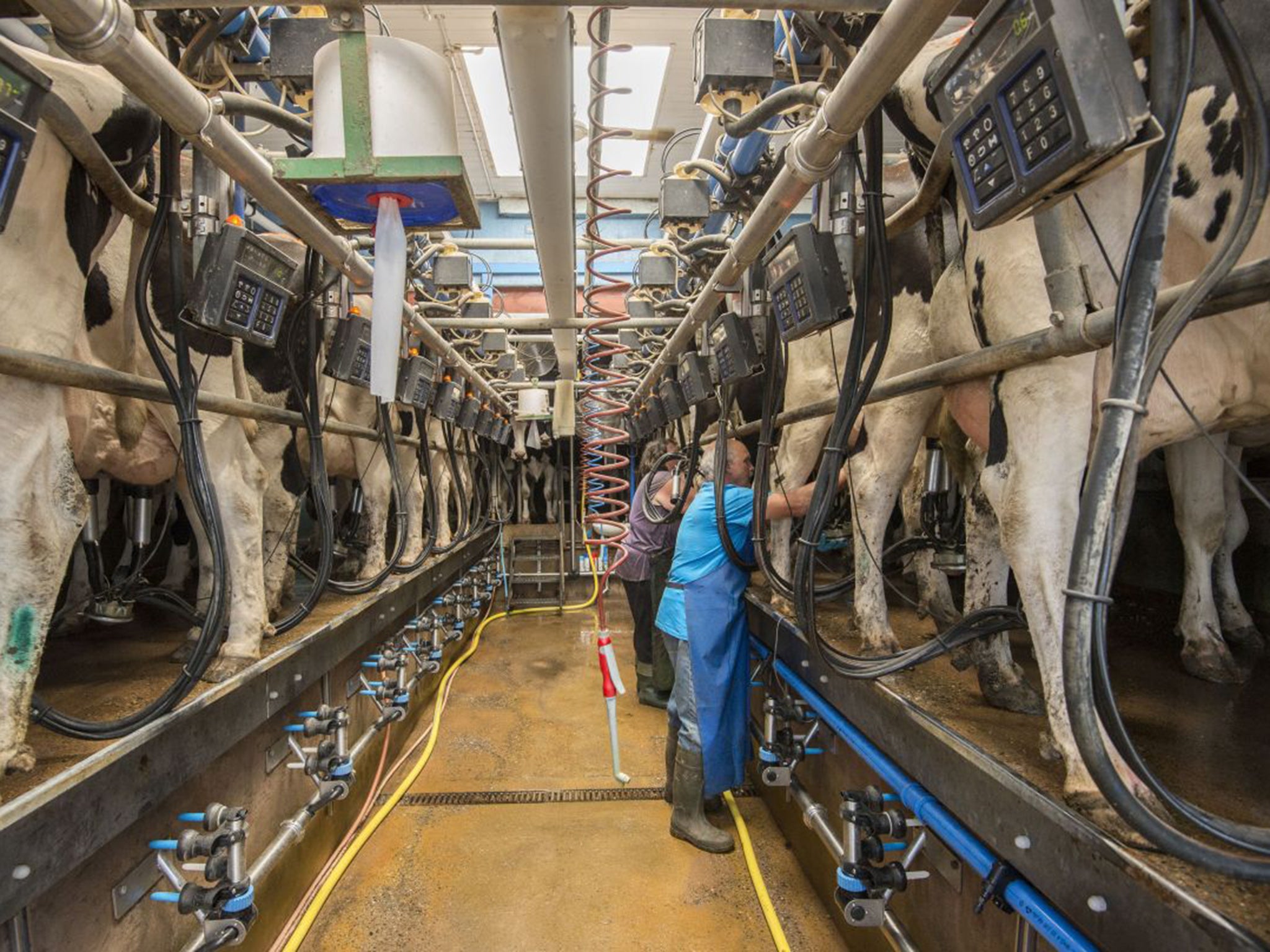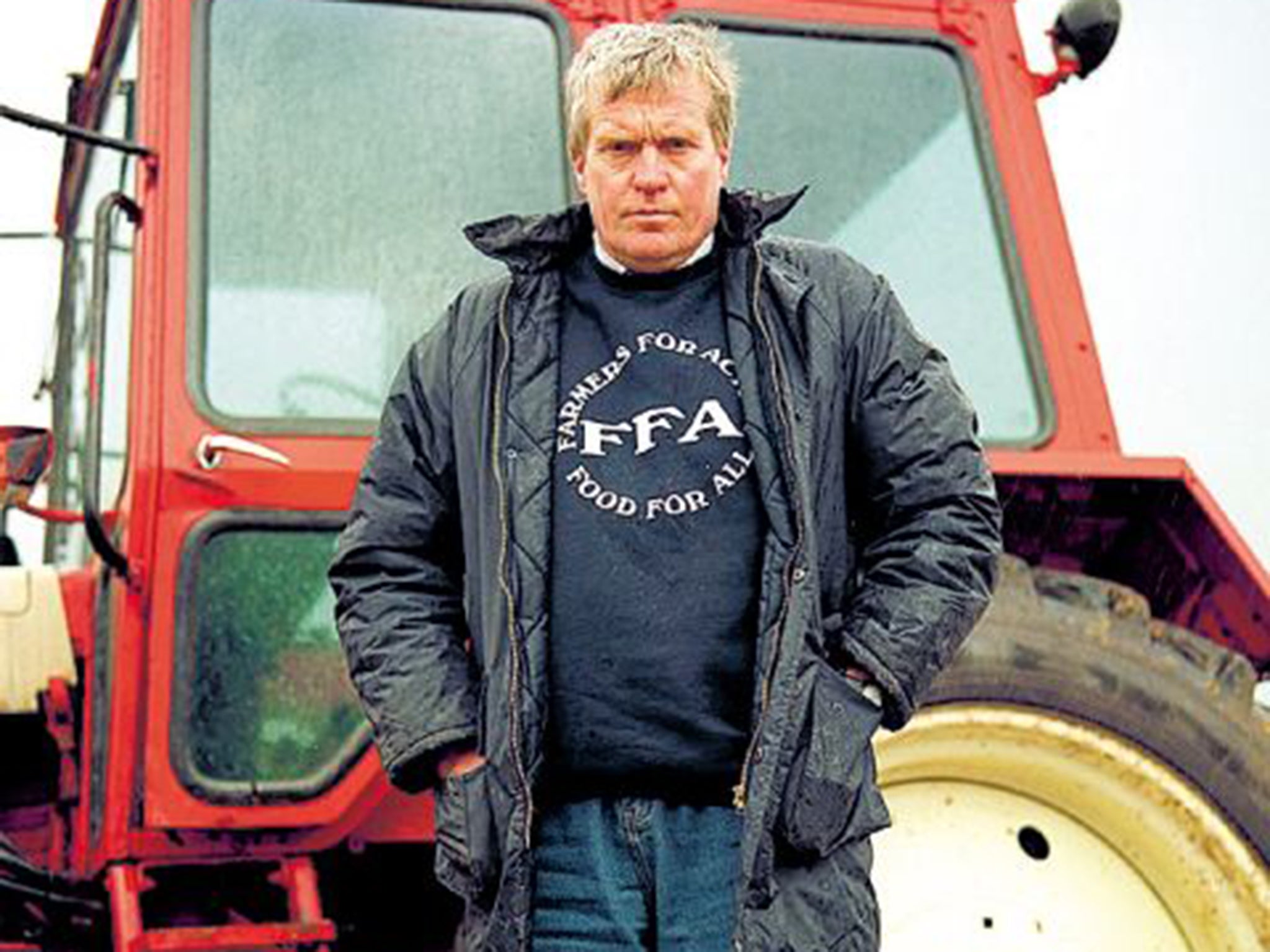UK’s most militant farmer says he 'will picket stores and tell customers truth about milk prices'
Protester claims that supermarkets’ squeeze on dairy producers is going to put them out of business

Your support helps us to tell the story
From reproductive rights to climate change to Big Tech, The Independent is on the ground when the story is developing. Whether it's investigating the financials of Elon Musk's pro-Trump PAC or producing our latest documentary, 'The A Word', which shines a light on the American women fighting for reproductive rights, we know how important it is to parse out the facts from the messaging.
At such a critical moment in US history, we need reporters on the ground. Your donation allows us to keep sending journalists to speak to both sides of the story.
The Independent is trusted by Americans across the entire political spectrum. And unlike many other quality news outlets, we choose not to lock Americans out of our reporting and analysis with paywalls. We believe quality journalism should be available to everyone, paid for by those who can afford it.
Your support makes all the difference.Britain’s most militant farmer has revealed that his group plans to picket customers as they enter supermarkets in protest against the “squeeze” on milk prices, as he warns the situation is so dire that he could be forced to quit dairy farming within months.
In an interview with The Independent, veteran farming campaigner David Handley, who rose to prominence by leading fuel blockades in 2000, said he would no longer tolerate the supermarkets’ persistent chipping away of “farm-gate” prices.
Sixty-three-year-old Mr Handley, who has twice been voted farming personality of the year, said he is talking to the supermarkets to determine which ones are not “moving in the right direction” on dairy prices.
He expects to complete the audit around the middle of August, and will “name and shame” the worst offenders shortly afterwards.

The campaign will also see members from his Farmers For Action campaign group standing outside supermarket entrances to inform customers about how badly the shops are treating milk producers. Food services groups and hotels could also be targeted.
“We have made it perfectly clear that we are not going to tolerate this any longer,” Mr Handley said.
“We are talking to retailers, asking them: ‘Why do you continue to devalue the product, sucking money out of the supply chain, when you know full well that we’ve got dairy farmers exiting the industry because they face bankruptcy?’”
Farmers have been hit hard in the past two years as supermarkets have consistently reduced the prices they pay for milk and other dairy products. At the same time, grain and energy prices have soared – meaning that many farmers are making a loss on their production.
The price of milk in shops has tumbled from 32p a litre last spring to about 24p – meaning it now costs less than bottled water. The falling price has pushed farmers such as Mr Handley, who has a 140-head Jersey herd at his Monmouthshire farm, into the red.
“We intend to have a campaign where we go to their stores and we tell the consumer exactly what is going on inside the walls of the stores they’re walking in to,” Mr Handley said. “We intend to make sure the consumer knows the full facts.”
Mr Handley has threatened to quit dairy farming because of the financial pressures and says he has already begun selling off all his “young stock” in preparation – but he told The Independent he had yet to make a final decision about his own future.
He said it is far too soon to say which supermarkets would be named and shamed, although he did commend the performance of Waitrose and Marks & Spencer – suggesting they would be among the retailers who would escape the action.
“I think all the retailers are getting very, very worried and very, very concerned. There’s a countryside expression: ‘At the moment they’re like rabbits with a headlight on them’. They’re not quite sure which way to jump,” said Mr Handley, who founded Farmers for Action in 2000.
The number of dairy farmers in the UK has halved to 10,400 in the past decade, as rising costs and falling prices have squeezed many out of existence, he said. “Fifty dairy farmers went out of business in June alone. If you multiply that up, that tells me that within five years we’ll probably have about 5,000 dairy farmers left. That’s not going to be good news for consumers in the long run.”
Mr Handley is Britain’s most high-profile dairy farmer. He first came to prominence in 2000 when he took part in a Channel 4 documentary, The Milk Wars, about the plight of being a small dairy farmer.
As a consequence of his prominence, he became something of a celebrity, appearing on ITV’s The Richard & Judy Show. He eceived the Dairy Industry Award in 2005 and the RABDF Princess Royal Award for services to the dairy industry. He unsuccessfully challenged for the leadership of the National Farmers Union in 2006.
Cost of a pint: What farmers are up against
What is the farmers’ problem with the supermarkets?
The major retailers are waging a sustained price war on milk in a bid to entice shoppers into their stores. This has involved a prolonged “squeeze” on dairy farmers on price, which they can do little about because the supermarkets are so powerful.
Surely it’s not that simple?
True. Farmers’ costs have grown considerably in recent years due to the soaring prices of energy and grain.
Is there an international dimension?
Not for liquid milk because it’s cheap, has not got a long shelf life and bulky, and therefore doesn’t lend itself to the export market. But items such as milk powder and cheese face an extra pressure on price in the UK as a result of a supply glut overseas.
Join our commenting forum
Join thought-provoking conversations, follow other Independent readers and see their replies
Comments